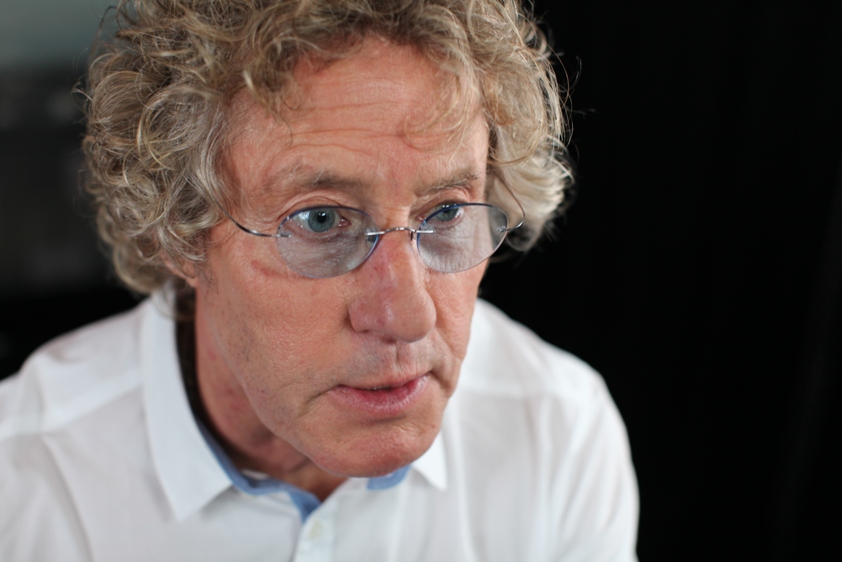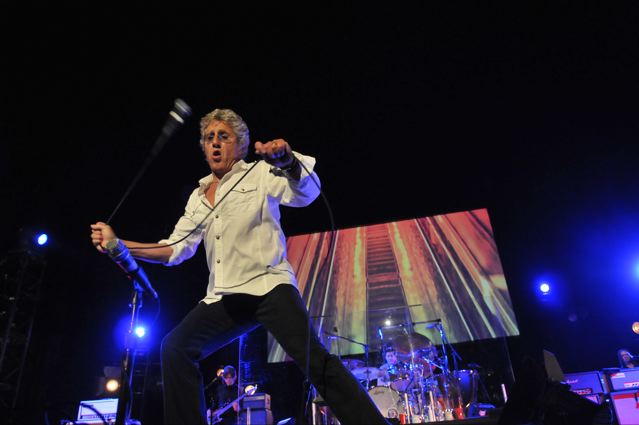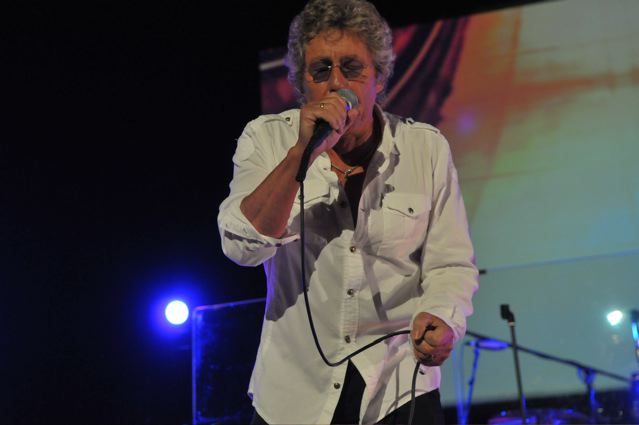In
1965, The Who released the single “The Kids are
Alright,” a catchy ode championing the power of teens.
Now, almost fifty years later, the band’s lead singer
Roger Daltrey is still taking care of the kids.
Together, Daltrey and fellow Who partner Pete Townshend
are aligned with the UCLA Health System and have created
Teen Cancer America, an outreach of the UK Teen Cancer
Trust. Dedicated to constructing specialized medical
units designed specifically to suit the physical and
emotional needs of teenagers afflicted with the disease,
the UCLA Daltrey/Townshend unit is slated for completion
in the summer of 2012. From there, the Daltrey/Townshend
Teen Cancer America program has plans in the works to
build additional centers throughout America.
Passionately committed to the cause, we met with Roger
Daltrey at UCLA who shared the background about this
important and groundbreaking program.
Teenagers have
been so important in your career with The Who and here you are
giving back. Why
Teen Cancer America?
Basically, I
wouldn’t have the privileged life I’ve had without the support of
teenagers. When you think about the music business as we know it
it’s built on the backs of teenagers. So I just feel at this time
in my life where I’ve got time on my
hands - more than I’ve had for years and years
- this is something I
can do to give something back and hopefully something I can get done
in my lifetime. Even if I’ve only got ten years left,
I can see that once it’s out there it
will be there forever.
 How did you
get involved with Teen Cancer America?
How did you
get involved with Teen Cancer America?
I got involved
in it from the beginning. The whole idea for the Teen Cancer Trust
in England was started by my doctor and his wife, who recognized this
age group just didn’t exist in the medical profession, which is kind
of weird. Didn’t James Dean and Elvis show us that there was
something in between? (laughs) They watched this situation in our
National Heath Service where teens stricken with cancer were stuck
next to a geriatric dying of cancer. This was a terrible situation.
So they decided to provide these spaces where every teen who gets
cancer in our country would be catered for in a place that is
teenage friendly, a place designed by teenagers, where they could
behave like teenagers. They can cook for themselves. They can have
MTV all night. They can get all their treatment. Their parents are
cared for and given support, which is hugely important. By
putting
them together their whole well being changed, I’ve seen it with my
own eyes. I can give you an example. We actually have to build these
in England and it’s very expensive. We were going to build this one in
Cardiff, in Wales. Because of the way the hospital was built, we had
to design it to build on stilts. The costs of this one unit was
three and a half million pounds, which is about six million dollars. The
head nurse of adolescent medicine in the hospital, wrote a letter
complaining, “This amount of money should never have been spent.
This is insane to spend this much money!” Anyway, we built it and
this same nurse took teenagers all around the hospital, some with
children, and some with old farts like me.
Within a week she
wrote us a letter and said, “I’ve seen miracles. I’ve seen a boy
who’s not gotten out of bed for two months and now has been through
every inch of this unit. He’s a different boy, completely changed.”
The letter just says it all because she just couldn’t see it. But
when she worked on it, she said, “To come to work now, I’m doing the
same job I have done but it’s a joy being here now because the teens
are so much happier. They’re all together and they support each
other. They talk each other throughout the illness.” It’s just
wonderful. So for the last ten years I’ve been trying to get it over
here and I just got lucky. I did a charity event for autism and
another program in LA called “Canine Connection” where they put young
teenagers who’ve gone astray, one step out of jail, and they give
them a dog and it’s healing. All of a sudden they get something to
love in their life and that changes them as well. So we did this
show and I happened to meet David Feinberg who runs the UCLA
Hospital. I told him about what we were doing, because he’s an
eminent child psychologist. He totally got it. He said, “I’m
going to
make sure we do that.” That was two, three years ago. And here we
are. We’ve done the fundraiser to raise the money to put in it and
it will hopefully be up and running by June or July.
 Is
it similar to what’s set up in England with the amenities for the
teens?
Is
it similar to what’s set up in England with the amenities for the
teens?
Yes. UCLA sent
a team over to England two years in a row and they studied
everything we do. David Feinberg sent a team over,
initially to figure out whether it was worth doing. You can’t do
this without the help of everybody being committed and saying we’re on board on
this, because this will make everybody’s life easier. It’s just a
bit of organization within the hospital, that’s all it is. So he
sent a team over and they said, “We’ve got to have it.
It’s the gold
standard.” And from then on it has run its course. Like I said, it will
be finished in July and it’s the first one. It’ll be called the Daltrey/Townshend unit. They wanted to call it that, we certainly
didn’t insist on it. (laughs) I’m very honored that they’ve done
that. We’re in the process of putting the team together for the Teen
Cancer America Foundation organization in place. But while that’s
happening UCLA are acting as our broker. If you go onto their web
site, you can go into Teen Cancer America and they’ve got an escrow
account and they’re holding onto the money. If you want to
contribute some money, you can do so. I encourage everyone to
help. If money comes through Teen Cancer America it will then go to
the hospitals around America where we’ll build these units.
How would you
encourage people to get involved?
I’d encourage
people to get involved with fundraisers, as well as awareness, because
teens suffer from the worst cases of late diagnosis because they’re
so active. They get a bump and think, “Oh, I cut my leg playing
football” and it’ll be aching for a week. Then after two weeks they
might go and see a doctor who could see, “Well, you’ve got a bruise
playing football” and leave it at that. Then they’ll go back in
another month after it still hasn’t healed and they’ve got something
really serious. So awareness and more education is crucial. We
provide in that we go around to schools teaching teens. Don’t be
frightened to check your balls and your breasts.
You’ve got to do it.
It really is important. It’s such a closed-up society and people get
embarrassed to talk about it, but you need to do it. You must save
your life.
 Tell us about
“Who Cares.”
Tell us about
“Who Cares.”
The first
thing we created was the “Double O” charity and we did all kinds of
different things. Then Pete (Townshend) took that over after Keith
(Moon) died. We all still did things for it, but he kind of ran
that. “Who Cares” is just the name we put on all of our charitable
work. We’ve performed at so many charity events, so it seems right to
have a name for what we do. Who cares just says it all. You can only
do it if you believe in it. That’s how I
am.
You recently
headlined a show at London’s Royal Albert Hall which featured an
appearance by Paul McCartney.
That’s right.
Well, I’ve run that for 12 years. It’s a week of concerts. I get
artists to come and do the show for nothing.
It’s at the Royal
Albert Hall, which is a very prestigious venue in London. It’s the
most wonderful venue to play. I’ve had tremendous support from the
music industry. It’s all for the Teenage Cancer Trust. That night
with Paul was great because Ronnie Wood was on the stage as a well.
So there was a Stone, a Beatle and a Who onstage, so that was rare.
I’ve shared the stage with Paul before at Live Aid and then Live 8.
Paul was incredibly generous. He was fabulous. Sadly, he’s had
first-hand experience with how nasty that disease is, with the loss
of his wife from this awful disease.
It must feel
good to give back.
Hey, I’ve been
given a lot. My life’s been a dream, so I’m very happy to give back
to something that really counts.
Lastly, what
are your hopes for the future of Teen Cancer America?
I just hope I
can inspire people to understand how needed this is, looking after
this age group, because they are going to be your future leaders and
they will create a better world. You look after them when they’re
being kicked, it will change things. Make no bones about it, the
idea for this cancer charity is once we get these units in, all of
them will have access. It’s not going to be exclusive to the ones who
have money and the others won’t get in. There’s not going to be any of
that stuff. I can’t change the world, but I can build a brick.
That brick might go on to build a very big city.